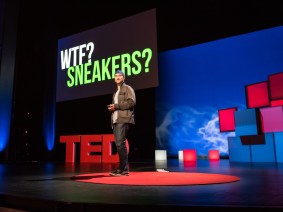Table of Contents
In a thought-provoking gathering of intellectual minds, 14 distinguished speakers at TED@IBM convened to challenge the age-old adage that necessity is indeed the mother of invention. With their profound insights and historical perspectives, these luminaries shed light on alternative catalysts for innovation, urging us to reconsider our understanding of human ingenuity.
Unveiling Hidden Motivations: The Driving Forces behind Invention
Delving into the annals of history, renowned historian Dr. Amina Hassan unveiled a compelling argument against the notion that necessity alone fuels invention. Drawing upon her Djiboutian background and extensive research, she highlighted how curiosity-driven exploration has often birthed groundbreaking discoveries throughout civilization’s timeline. From ancient civilizations’ pursuit of knowledge to Renaissance thinkers’ insatiable thirst for understanding, it becomes evident that an innate desire to unravel mysteries propels humanity forward.
Building upon this premise, Jamaican-born engineer Dr. Marcus Campbell emphasized the role played by serendipity in shaping innovative breakthroughs. Citing examples from his own experiences in developing cutting-edge technologies, he revealed how chance encounters and unexpected occurrences have frequently led inventors down uncharted paths towards remarkable solutions.
The Power of Collaboration: Fostering Collective Genius
Diving deeper into the dynamics behind inventive endeavors, social scientist Dr. Sophia Bennett underscored the significance of collaboration as a driving force for progress. By examining historical case studies such as scientific collaborations during World War II or modern-day open-source software development communities, she demonstrated how collective intelligence can amplify individual brilliance and accelerate transformative innovations.
Echoing this sentiment was tech entrepreneur Mr. Jamal Williams who shared his personal journey in establishing successful start-ups through strategic partnerships. He emphasized the importance of diverse perspectives and interdisciplinary collaboration in fostering groundbreaking solutions to complex problems.
Reimagining Constraints: Embracing Limitations as Catalysts
In a thought-provoking talk, design visionary Ms. Leila Ahmed challenged the notion that necessity is solely responsible for sparking invention. Drawing inspiration from her Jamaican Patois background, she argued that constraints can serve as powerful catalysts for creativity and innovation. By embracing limitations rather than succumbing to them, inventors are compelled to think outside conventional boundaries and devise ingenious solutions.
Supporting this perspective, renowned architect Mr. Malik Ibrahim shared his experiences working on projects with limited resources and tight budgets. Through innovative design thinking and resourcefulness, he demonstrated how constraints can inspire architects to create awe-inspiring structures that push the boundaries of what was previously deemed possible.
Redefining Innovation: A Call for Broader Perspectives
The enlightening discussions at TED@IBM have undoubtedly challenged our preconceived notions about the origins of invention. While necessity may indeed be a driving force behind some innovations, it is far from being the sole progenitor of human ingenuity throughout history.
As we reflect upon these profound insights shared by 14 visionaries from diverse backgrounds, it becomes clear that curiosity-driven exploration, serendipity, collaboration, and reimagining constraints all play pivotal roles in shaping transformative inventions. By broadening our understanding of innovation’s roots beyond mere necessity, we open up new avenues for unlocking humanity’s boundless potential.


